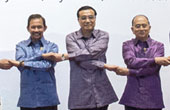Obama takes executive action on immigration
By AP and Chen Weihua in washington (China Daily USA) Updated: 2014-11-21 10:39
 |
|
US President Barack Obama announces executive actions on US immigration policy during a nationally televised address from the White House in Washington, November 20, 2014. [Photo/Agencies] |
Spurning furious Republicans, President Barack Obama took wide executive action on immigration Thursday night to spare nearly 5 million people in the US illegally from deportation and refocus enforcement efforts on "felons, not families."
The moves, affecting mostly parents and young people, marked the most sweeping changes to the nation's fractured immigration laws in nearly three decades and set off a fierce fight with Republicans over the limits of presidential powers.
In a televised address to the nation, Obama defended the legality of his actions and challenged GOP lawmakers to focus their energy not on blocking his actions but on approving long-stalled legislation to take its place.
"To those members of Congress who question my authority to make our immigration system work better, or question the wisdom of me acting where Congress has failed, I have one answer: Pass a bill," Obama said.
Despite that challenge from the president, his actions and the angry Republican response could largely stamp out prospects for Congress passing comprehensive immigration legislation under the current administration, ensuring that the contentious debate will carry on into the 2016 presidential campaign
While Obama's measures are sweeping in scope, they still leave more than half of the 11 million people living in the US illegally in limbo. The president announced new deportation priorities that would compel law enforcement to focus its efforts on tracking down serious criminals and people who have recently crossed the border, while specifically placing a low priority on those who have been in the US for more than 10 years.
He insisted that his actions did not amount to amnesty.
"Amnesty is the immigration system we have today — millions of people who live here without paying their taxes or playing by the rules, while politicians use the issue to scare people and whip up votes at election time," Obama said.
Stan Tsai, chairman of the Chinese Culture and Community Service Center (CCACC), said he appreciated that Obama was "really brave and courageous" to face the real issues.
"Some undocumented immigrants from East Asia do benefit from this executive order and will contribute a lot to the US in rest of their life without hurdles from immigration law and the expensive lawyers," Tsai said. "I am happy to see it happen."
Susan Lee, a Democrat elected to the Maryland state Senate earlier this month, said it was time that a US leader addressed the issue.
"I feel so excited that President Obama finally does something on immigration reform, because the Congress hasn't been able to move on it," she said. "You can't ignore the issue. This issue has to be addressed."
Lee said she hopes it will be a type of immigration reform that guarantees the reunification of families and increases opportunities for those who work in science and technology, mainly coming from Asian countries such as China and India, and would like to get green cards to work here.
"It will probably increase investments from those countries in Asia. It will be good for America's economy and will really benefit the Chinese-American community," she said.
The top 10 home countries for the 11 million undocumented immigrants in the US are Mexico, El Salvador, Guatemala, Honduras, the Philippines, India, South Korea, Ecuador, Brazil and China. Those from Mexico account for more than half of the total.
Sheng Yang contributed to the story.
- Full text of President Obama's speech on immigration plan
- Obama announces action on sweeping US immigration reform
- Obama says his immigration plan is lawful
- Republicans eye strategy to block immigration plan
- Obama defiant, vows immigration action this year
- Obama signals timing of new immigration measures in question
- Chinese keen on investment immigration program










